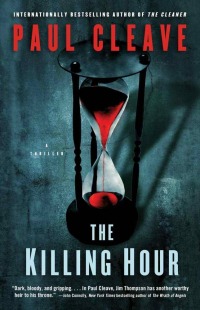Five Minutes Alone by Paul Cleave
 Friday, November 7, 2014 at 9:05AM
Friday, November 7, 2014 at 9:05AM 
Published by Atria Books on October 21, 2014
Except for Ahab and people who share his obsessive nature, the desire for vengeance is a passing emotion. Those who do seek revenge cause dire and unintended consequences without finding the closure they crave. On the other hand, those who want their better selves to prevail sometimes entertain a revenge fantasy, even if they never carry it out. The conflicting desires that are part of human nature are at the heart of Five Minutes Alone.
Paul Cleave writes novels that his publisher calls Christchurch Noir. Five Minutes Alone is the fourth in the Theodore Tate series. It makes frequent references to events from earlier novels that had a traumatic impact on DI Tate and two of his colleagues, but the backstory is filled in so completely that this can easily be read as a standalone novel.
Five Minutes Alone opens with Kelly Summers on the verge of being raped by Dwight Smith for the second time. In the chapters that follow, the police are investigating Smith's death, Smith having been splattered by a train. The police soon discover that the death was not be a suicide, which leaves Tate wondering who deserves New Zealand's gratitude for ridding it of Smith.
We learn early on that the vigilante dubbed The Five Minute Man by Christchurch journalists is Carl Schroder, who was a detective and Tate's partner until he was shot in the head. Crime victims used to say to Schroder, "Just give me five minutes alone with him." Freed from the constraints of law enforcement, Schroder has a new sense of what constitutes justice. He not only wants to give people their five minutes, he virtually forces them to rekindle the fires that have cooled with the passage of time.
The story pits old friends Tate and Schroder against each other, although Tate lacks the reader's early knowledge that Schroder is contributing to the latest crime spree in Christchurch. Tate has his own experience with revenge killing and is not well positioned to place moral judgment on Schroder. The question that the reader ponders for much of the novel is how Tate will handle the conflict. Five Minutes Alone is a story of divided loyalties -- each man has the ability to bring down the other, but will he do it?
When I started reading Five Minutes Alone, I thought it would be another mundane vigilante novel. I was wrong. The story is surprisingly subtle and its message reflects the complexity of human emotion. The struggles that the characters experience seem authentic and heartfelt. The novel features snappy action scenes that are more original than is common in action-based thrillers, but its true value lies in the evolution that its central characters experience and in the different perspectives that secondary characters provide to illuminate the meaning of justice. The novel's fault is its predictable ending, although the last few paragraphs I did not anticipate. Still, Five Minutes Alone is about characters and philosophy more than plot.
RECOMMENDED
